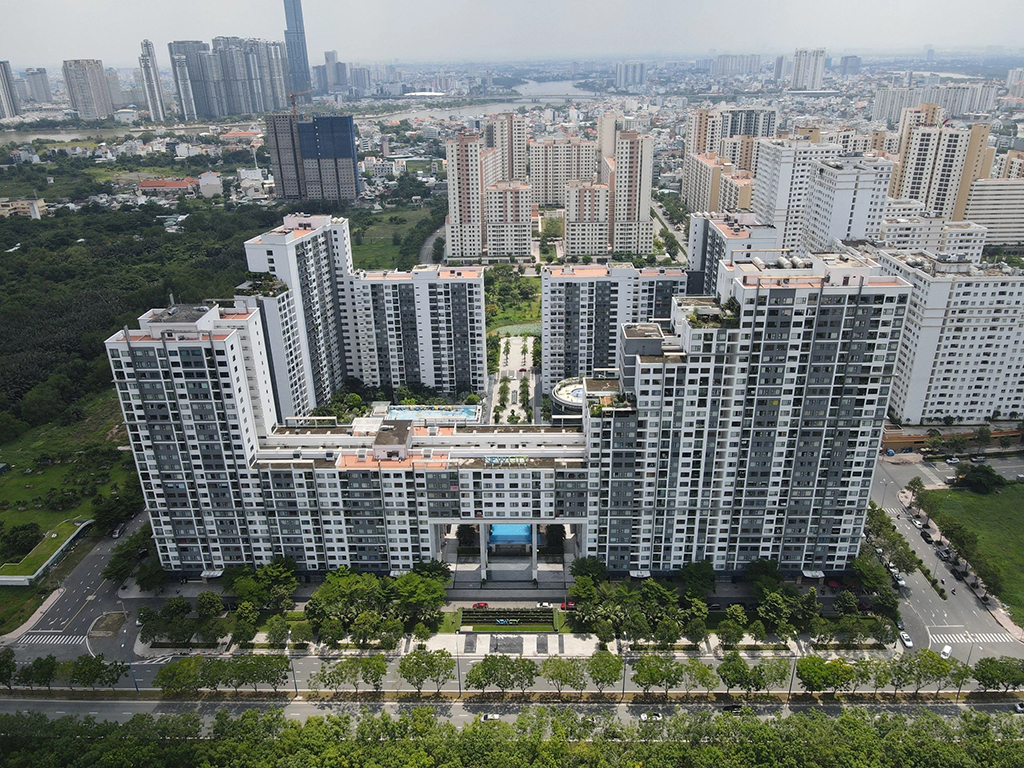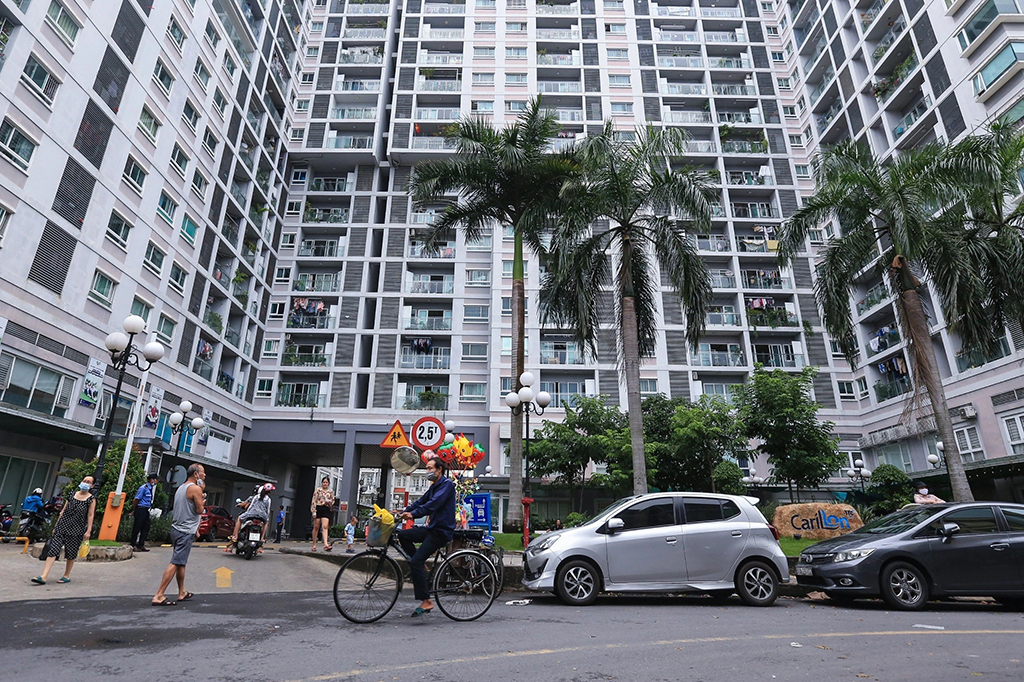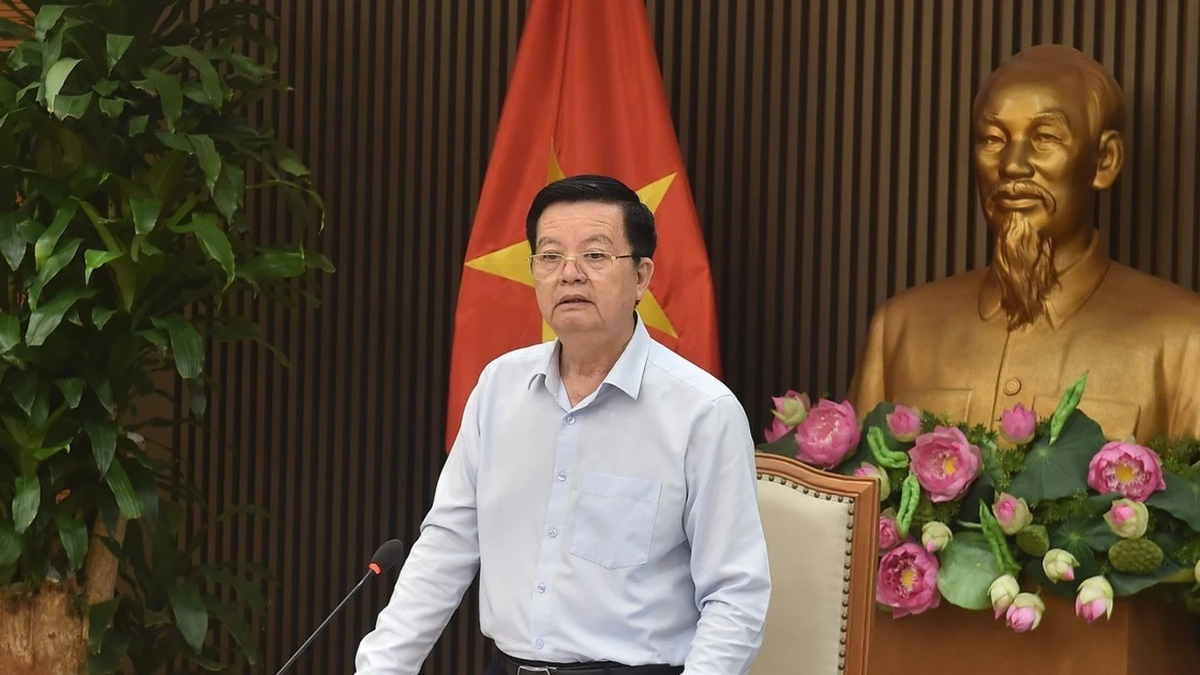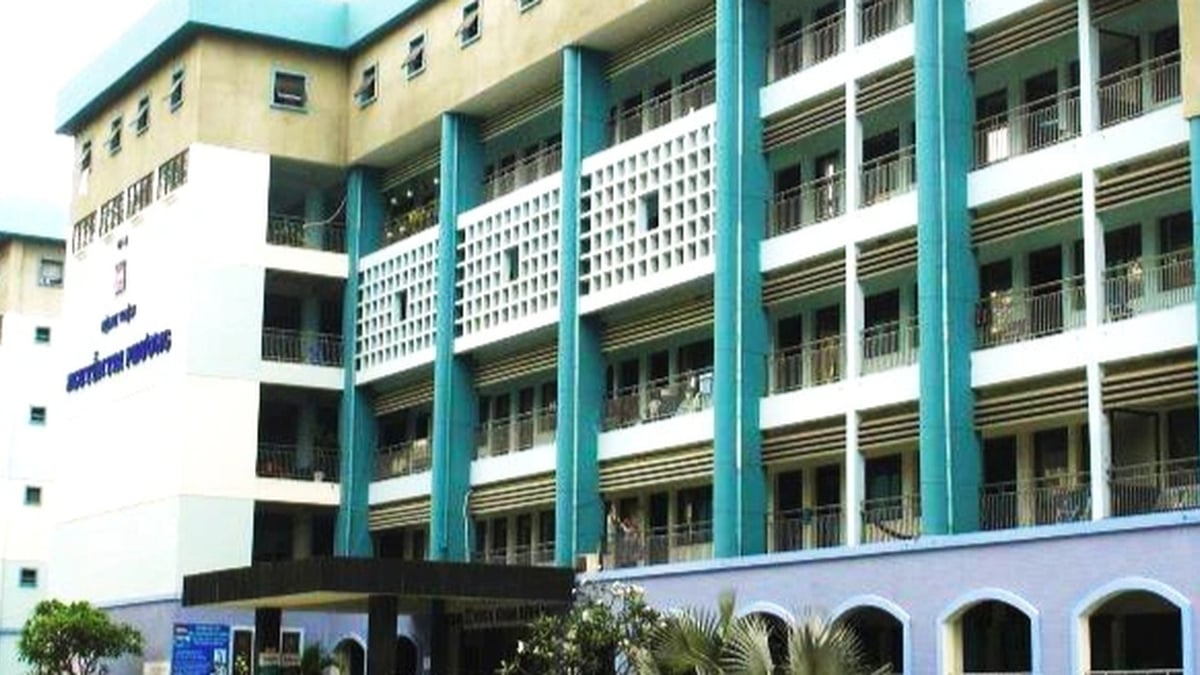Prevent "false advertising"
At a recent meeting to finalize the draft Decree detailing a number of articles of the 2023 Housing Law, Mr. Le Hoang Chau, Chairman of the Ho Chi Minh City Real Estate Association (HoREA), proposed that there should be regulations requiring investors to register for apartment building classification before being allowed to open for sale.
Explaining this proposal, Mr. Chau analyzed: the previous Housing Law assigned the Minister of Construction to issue regulations on classifying apartments into classes 1, 2, 3 and 4; currently, it is classified as A, B and C. However, in reality, no investor or collective of apartment owners (customers) has proposed classifying apartment buildings nor implemented it. In the 2023 Housing Law, which is about to take effect, the classification of apartment buildings is assigned to the Government for promulgation. In the draft Decree detailing a number of articles of the 2023 Housing Law, the classification of apartments can only be carried out when the project has been completed. However, the 2023 Real Estate Business Law stipulates that investors are allowed to sell or lease-purchase future housing when the construction of technical infrastructure has been completed according to regulations. In the case of apartment buildings and mixed-use buildings with housing, it is only necessary to complete the construction of the foundation according to regulations.

Requiring investors to register apartment building rankings before raising capital and opening for sale will help avoid the situation of "self-proclaimed" and "false advertising".
"This is the stage where customers are easily deceived when investors have self-ranked and upgraded their apartments to super luxury, first-class or foreign names such as High-end, Premium... to sell at sky-high prices. The situation of "hanging a sheep's head but selling dog meat" occurs in many places. Meanwhile, the Advertising Law also stipulates a ban on products of enterprises (DN) claiming to be "number one, first-class". Therefore, it is necessary to stipulate that enterprises register to rank apartments right from the beginning when the project is approved for investment policy", Mr. Le Hoang Chau emphasized.
The HoREA Chairman also said that requiring apartment buildings to be ranked from the beginning when the project is implemented does not restrict investors from changing the type of apartment building later. During the implementation process, investors can notify to change the ranking if they upgrade to a higher level. "Current regulations also encourage investors to build green, energy-saving buildings...
If the investor has a long-term vision, aiming to build projects following this trend, the cost will only increase by 2-3%, while if they convert during the construction process, the cost will be much higher. Because customers today are interested in more than just a place to live, investors not only sell apartments but also living space and utility services. Projects with lots of trees, utility services, and a harmonious living environment are more popular with customers and from there can be called high-class, luxury apartments...", Mr. Chau cited.
Chaos in ranking luxury apartments
This is not the first time HoREA has proposed to announce the ranking of apartments before opening for sale. Since 2018, this unit has issued a document stating the chaotic status of high-end apartment titles in the housing market. At that time, apartment traders always arbitrarily used the terms "high-end" and "luxury" to attract customers. In reality, very few real estate projects meet high-end standards, ensuring quality and class in planning, design, utilities and services. Many projects are self-proclaimed high-end projects by investors but have not been recognized by the Department of Construction or an independent assessment unit. This also leads to many "tragicomedy" situations when residents buy apartments that are called high-end but are of poor quality.
For example, on the company's website, The Art apartment building (Thu Duc City, Ho Chi Minh City) is introduced as a breakthrough apartment project when it first implemented the idea of building a luxury apartment complex exclusively for young intellectuals; located in the high-end residential area Gia Hoa Art Village, nearly 28.5 hectares wide with many public utilities serving the residential community. The selling price of apartments here is quite high, ranging from 35.4 - 42.7 million VND/m². However, in 2023, at this apartment building, there were continuous situations of residents gathering, hanging banners protesting many shortcomings in infrastructure and services such as leaking elevators, water flowing in like a waterfall every time it rained; empty fire protection boxes, no equipment. In the parking basement, two out of four exits were blocked, making residents worried about having no way out in case of an incident, fire, etc.
It is worth mentioning that the management board is managing 60 billion VND of the apartment maintenance fund, so residents believe that the management board has not fulfilled its duties, managed the maintenance fund ineffectively, causing the apartment building to increasingly deteriorate. More than 900 residents have signed a petition to reflect a series of frustrations at this apartment building and request the management board to resign. It was not until the end of July 2023, when the local government held an extraordinary apartment building conference to re-elect the management board, and the entire old management board resigned, that the residents' frustrations temporarily "cooled down".
Similarly, when looking to buy an apartment at Topaz Home 2 apartment building (Thu Duc City), Mr. Minh Man (living in District 8, Ho Chi Minh City) was attracted by many beautiful words such as: "bright spot" in the heart of the Eastern City, located in the middle of a modern and developed urban area, the project has full amenities suitable for the type of apartment that is not only high-class but also modern. It is worth mentioning that this is only a social housing project. When he arrived at the site, Mr. Man was "shocked" to see many banners hung on the doors of the apartments to protest the investor regarding the unsafe fire safety situation, parking spaces, elevator systems... degraded, damaged, unsafe, maintenance funds and many other issues.

Proposal to rank apartment buildings before investors raise capital and open for sale to customers
In Hanoi , the Artemis apartment building (No. 3 Le Trong Tan, Thanh Xuan District), although advertised as a luxury apartment building, residents have repeatedly expressed their anger and hung banners in protest when the investor arbitrarily increased parking fees, delayed the establishment of a management board; did not ensure fire prevention and fighting... The climax was the controversy over locking the wheels of personal vehicles at the end of last year. It is worth mentioning that because it is labeled a luxury apartment building, the price of apartments here is also sky-high, from 50.2 to nearly 70 million VND/m².
The situation of "everyone doing their own thing" in apartment classification is happening everywhere. The real estate trading website Batdongsan.com.vn said that this unit uses selling prices to classify apartments, however, the prices will vary depending on the market. For example, in Hanoi, the primary selling price of affordable apartments is under 30 million VND/m2; mid-range apartments are priced at 30 - 50 million VND/m2 and luxury apartments are over 50 million VND/m2. In Ho Chi Minh City, affordable apartments are priced under 35 million VND/m2; mid-range apartments are priced from 35 - 55 million VND/m2; luxury apartments are over 55 million VND/m2.
Meanwhile, CBRE Company has proposed higher prices to classify apartments. From the first quarter of 2024, CBRE will apply new apartment classification criteria such as super luxury apartments are projects with an average primary price of over 300 million VND/m²; luxury apartments are projects with an average primary price of 120 - 300 million VND/m²; high-end apartments have an average primary price of 60 - 120 million VND/m²; mid-range projects have an average primary price of 35 - 60 million VND/m²; economy class has an average primary price of under 35 million VND/m²...
Apartment classification according to standards is necessary
According to real estate expert Tran Khanh Quang, in the world there is no need for regulations requiring investors to register and publish apartment building rankings because the real estate market is public, transparent, and has a high level of consumer protection. The real estate market in Vietnam is not like that at present. In reality, how investors build projects, what is the quality, how customers access information... mainly through news and images from brokerage units, not through the quality of construction works. Therefore, ranking apartments and evaluating project quality according to standards is very necessary. Consumers need to access information accurately and clearly, what conditions are required for high-end apartments, what is the area, how is the public service area larger than mid-range and low-end apartments... The assessment should also be conducted by an independent unit to ensure objectivity and appropriateness.
A representative of a real estate company admitted that with the Housing Law taking effect on August 1, the regulation on apartment building classification prescribed by the Government will curb the situation where investors self-classify their projects as well as consulting and brokerage companies arbitrarily classifying them based on current prices. "Without classification, everyone will classify themselves as first class to increase prices and make it easier to sell. This not only causes confusion and damage to buyers, but also affects investors who do business properly. The market needs to be rearranged in its proper order by legalization," he emphasized.
Apartment classification
Apartment buildings are divided into 3 classes: class A, class B and class C. This classification is based on 4 specific groups of criteria, including: Planning - architecture; technical equipment system; services, social infrastructure; and quality, management, operation. In which, class A is an apartment building that fully meets the requirements for classification and must achieve at least 18 out of a total of 20 criteria as prescribed in Appendix No. 01; class B is an apartment building that must achieve at least 18 out of a total of 20 criteria as instructed in Appendix No. 02; class C is an apartment building that fully meets the requirements for classification but does not meet enough criteria to be recognized as class A and class B as prescribed.
Circular No. 31/2016 of the Ministry of Construction
Source: https://thanhnien.vn/chuan-hoa-quy-trinh-xep-hang-chung-cu-185240623205407405.htm




























![[Photo] National Assembly Chairman attends the seminar "Building and operating an international financial center and recommendations for Vietnam"](https://vphoto.vietnam.vn/thumb/1200x675/vietnam/resource/IMAGE/2025/7/28/76393436936e457db31ec84433289f72)





































































Comment (0)